英语语法省略句
- 格式:doc
- 大小:24.00 KB
- 文档页数:7
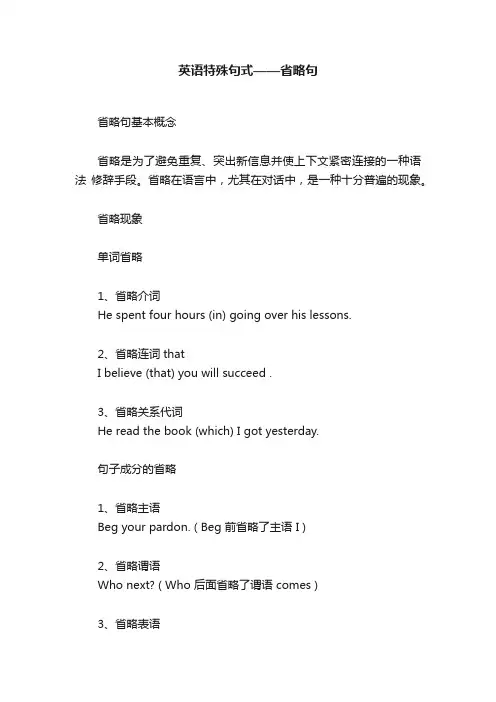
英语特殊句式——省略句省略句基本概念省略是为了避免重复、突出新信息并使上下文紧密连接的一种语法修辞手段。
省略在语言中,尤其在对话中,是一种十分普遍的现象。
省略现象单词省略1、省略介词He spent four hours (in) going over his lessons.2、省略连词thatI believe (that) you will succeed .3、省略关系代词He read the book (which) I got yesterday.句子成分的省略1、省略主语Beg your pardon. ( Beg 前省略了主语 I )2、省略谓语Who next? ( Who 后面省略了谓语 comes )3、省略表语Are you ready? Yes, I am. ( am 后面省略了 ready )4、省略宾语Let ' s do the dishes. I ' ll wash and you ' ll dry. ( wash 和 dry 后面省略了宾语 dishes )5、省略定语He spent part of the money, and the rest he saved. ( the rest 后面省略了定语 of the money )6、省略状语He was not hurt. Strange! ( Strange 前面省略了状语 how )不同句式中的省略1.简单句中的省略:在对话中,交谈双方都知道谈论的对象,则可以省略句子的主语,省略主语和谓语的现象在交际用语中出现的很多。
Sounds like a good idea.2.并列句中的省略:在并列句中,相同的成分如主语,谓语,宾语等都可以省略。
They learn French and we English.3.复合句中的省略:定语从句:That’s the reason he is late for the conference.状语从句:(1)时间状语从句中,省略“主语+be”:When (she was) very young,she began to learn to play the violin.(2)条件状语从句中,省略“主语+be”:If (he is) given more time, he will do the work better.(3)让步状语从句中,省略“主语+be”:Though (he is) a young man, he has made several inventions. (4)方式状语从句中,省略“主语+be”:She talked to the stranger as if (she were) absent-minded.(5)比较状语从句省略相关成分:由than或as引导的比较状语从句,在意义明确的情况下,可以省略than或as后面的相应部分,这一点与上述情况不同。
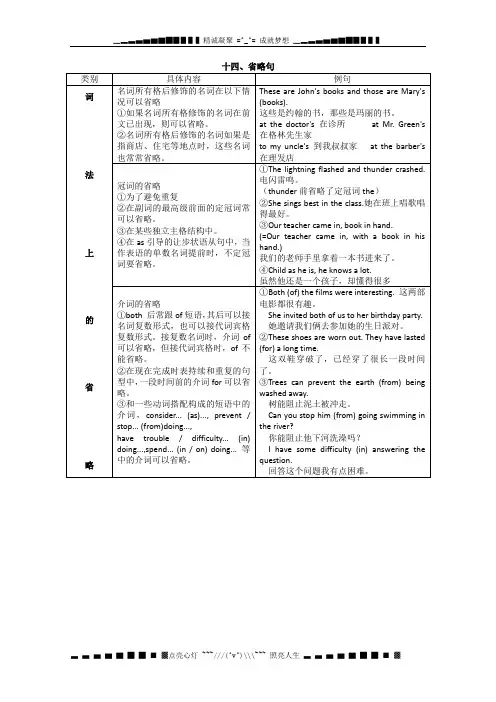
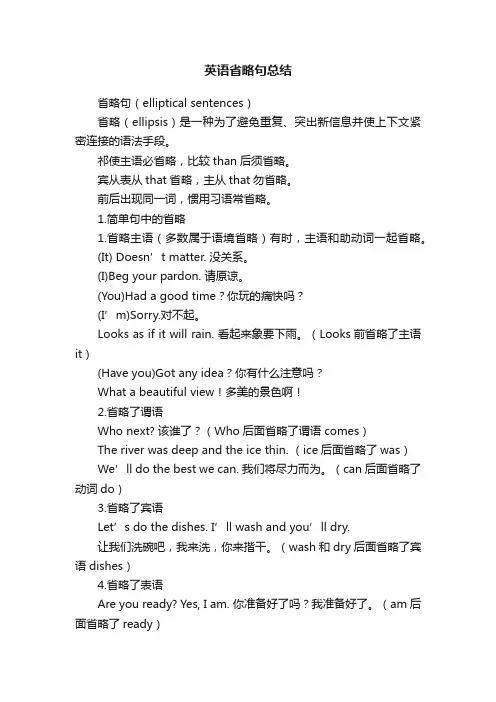
英语省略句总结省略句(elliptical sentences)省略(ellipsis)是一种为了避免重复、突出新信息并使上下文紧密连接的语法手段。
祁使主语必省略,比较than后须省略。
宾从表从that省略,主从that勿省略。
前后出现同一词,惯用习语常省略。
1.简单句中的省略1.省略主语(多数属于语境省略)有时,主语和助动词一起省略。
(It) Doesn’t matter. 没关系。
(I)Beg your pardon. 请原谅。
(You)Had a good time?你玩的痛快吗?(I’m)Sorry.对不起。
Looks as if it will rain. 看起来象要下雨。
(Looks前省略了主语it)(Have you)Got any idea?你有什么注意吗?What a beautiful view!多美的景色啊!2.省略了谓语Who next? 该谁了?(Who后面省略了谓语comes)The river was deep and the ice thin. (ice后面省略了was)We’ll do the best we can. 我们将尽力而为。
(can后面省略了动词do)3.省略了宾语Let’s do the dishes. I’ll wash and you’ll dry.让我们洗碗吧,我来洗,你来揩干。
(wash和dry后面省略了宾语dishes)4.省略了表语Are you ready? Yes, I am. 你准备好了吗?我准备好了。
(am后面省略了ready)He was a lover of sports as he had been in his youth.他还是象年轻时那样,是一位运动爱好者。
(had been后面省略了a lover of sports)5.省略了状语He was not hurt. Strange! 他没有受伤,真奇怪!(Strange前面省略了状语how)6.同时省掉句子几个成份。
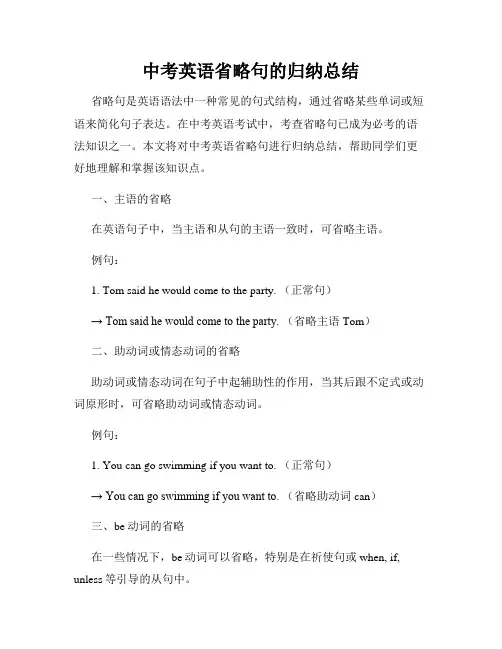
中考英语省略句的归纳总结省略句是英语语法中一种常见的句式结构,通过省略某些单词或短语来简化句子表达。
在中考英语考试中,考查省略句已成为必考的语法知识之一。
本文将对中考英语省略句进行归纳总结,帮助同学们更好地理解和掌握该知识点。
一、主语的省略在英语句子中,当主语和从句的主语一致时,可省略主语。
例句:1. Tom said he would come to the party. (正常句)→ Tom said he would come to the party. (省略主语Tom)二、助动词或情态动词的省略助动词或情态动词在句子中起辅助性的作用,当其后跟不定式或动词原形时,可省略助动词或情态动词。
例句:1. You can go swimming if you want to. (正常句)→ You can go swimming if you want to. (省略助动词can)三、be动词的省略在一些情况下,be动词可以省略,特别是在祈使句或when, if, unless等引导的从句中。
例句:1. Be quiet and listen to the teacher. (正常句)→ Be quiet and listen to the teacher. (省略be动词)四、状语的省略当主句和从句之间的时间状语、地点状语、方式状语等相同或相似时,可将其在从句中省略。
例句:1. He lives in Beijing and I live in Beijing. (正常句)→ He lives in Beijing and I do too. (省略相同的地点状语in Beijing)五、连接词的省略在句子中,连接词如and, but, or等可以省略,特别是在并列句中。
例句:1. She is tall and she is thin. (正常句)→ She is tall and thin. (省略连接词and)六、祈使句中的省略在祈使句(祈使句用于表达命令、请求、劝告等)中,主语you可以省略。
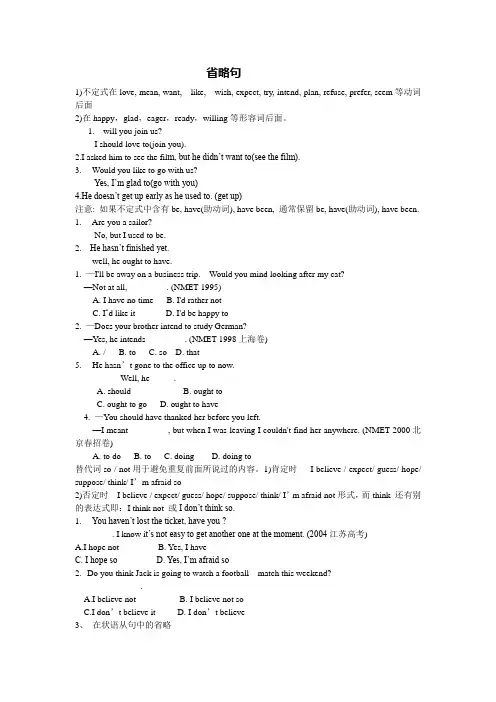
省略句1)不定式在love, mean, want, like, wish, expect, try, intend, plan, refuse, prefer, seem等动词后面2)在happy,glad,eager,ready,willing等形容词后面。
1.---will you join us?--- I should love to(join you).2.I asked him to see the fil m, but he didn’t want to(see the film).3.--- Would you like to go with us?--- Yes, I’m glad to(go with you)4.He doesn’t get up early as he used to. (get up)注意: 如果不定式中含有be, have(助动词), have been, 通常保留be, have(助动词), have been.1.--- Are you a sailor?--- No, but I used to be.2.---He hasn’t finished yet.---well, he ought to have.1. —I'll be away on a business trip. Would you mind looking after my cat?—Not at all, ________ . (NMET 1995)A. I have no timeB. I'd rather notC. I‘d like itD. I'd be happy to2. —Does your brother intend to study German?—Yes, he intends ________ . (NMET 1998上海卷)A. /B. toC. soD. that5.--- He hasn’t gone to the office up to now.--- Well, he _____.A. shouldB. ought toC. ought to goD. ought to have4. —You should have thanked her before you left.—I meant ________ , but when I was leaving I couldn't find her anywhere. (NMET 2000北京春招卷)A. to doB. toC. doingD. doing to替代词so / not用于避免重复前面所说过的内容。
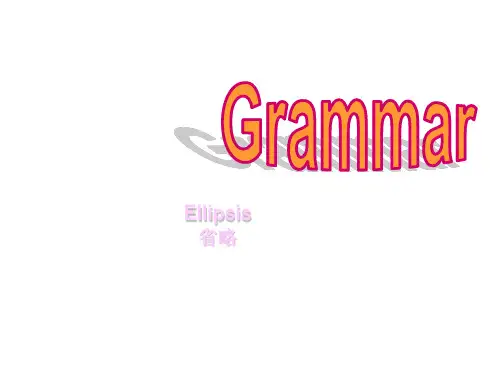
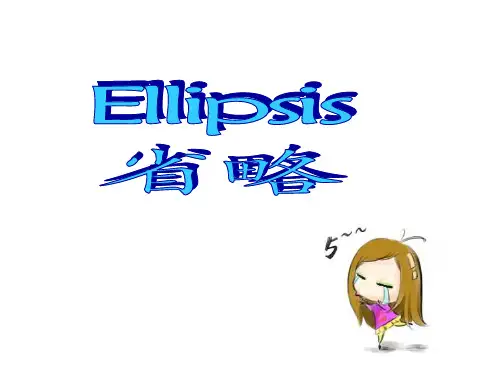

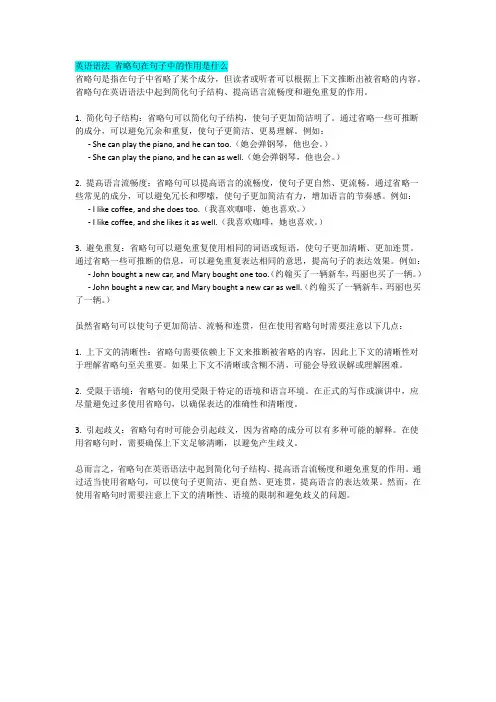
英语语法省略句在句子中的作用是什么省略句是指在句子中省略了某个成分,但读者或听者可以根据上下文推断出被省略的内容。
省略句在英语语法中起到简化句子结构、提高语言流畅度和避免重复的作用。
1. 简化句子结构:省略句可以简化句子结构,使句子更加简洁明了。
通过省略一些可推断的成分,可以避免冗余和重复,使句子更简洁、更易理解。
例如:- She can play the piano, and he can too.(她会弹钢琴,他也会。
)- She can play the piano, and he can as well.(她会弹钢琴,他也会。
)2. 提高语言流畅度:省略句可以提高语言的流畅度,使句子更自然、更流畅。
通过省略一些常见的成分,可以避免冗长和啰嗦,使句子更加简洁有力,增加语言的节奏感。
例如:- I like coffee, and she does too.(我喜欢咖啡,她也喜欢。
)- I like coffee, and she likes it as well.(我喜欢咖啡,她也喜欢。
)3. 避免重复:省略句可以避免重复使用相同的词语或短语,使句子更加清晰、更加连贯。
通过省略一些可推断的信息,可以避免重复表达相同的意思,提高句子的表达效果。
例如:- John bought a new car, and Mary bought one too.(约翰买了一辆新车,玛丽也买了一辆。
)- John bought a new car, and Mary bought a new car as well.(约翰买了一辆新车,玛丽也买了一辆。
)虽然省略句可以使句子更加简洁、流畅和连贯,但在使用省略句时需要注意以下几点:1. 上下文的清晰性:省略句需要依赖上下文来推断被省略的内容,因此上下文的清晰性对于理解省略句至关重要。
如果上下文不清晰或含糊不清,可能会导致误解或理解困难。
2. 受限于语境:省略句的使用受限于特定的语境和语言环境。
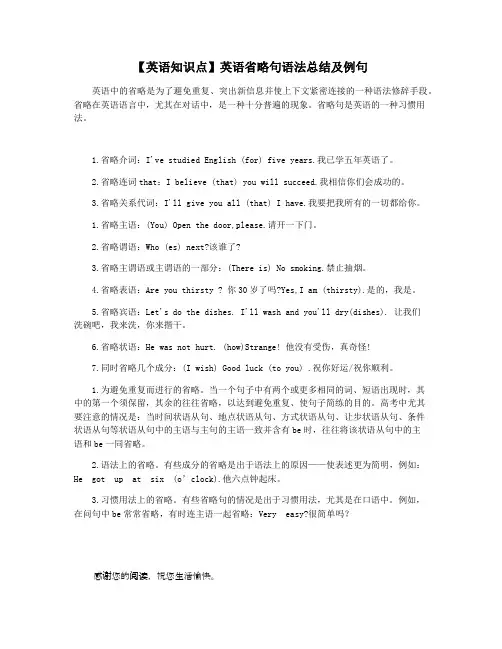
【英语知识点】英语省略句语法总结及例句英语中的省略是为了避免重复、突出新信息并使上下文紧密连接的一种语法修辞手段。
省略在英语语言中,尤其在对话中,是一种十分普遍的现象。
省略句是英语的一种习惯用法。
1.省略介词:I've studied English (for) five years.我已学五年英语了。
2.省略连词that:I believe (that) you will succeed.我相信你们会成功的。
3.省略关系代词:I'll give you all (that) I have.我要把我所有的一切都给你。
1.省略主语:(You) Open the door,please.请开一下门。
2.省略谓语:Who (es) next?该谁了?3.省略主谓语或主谓语的一部分:(There is) No smoking.禁止抽烟。
4.省略表语:Are you thirsty ? 你30岁了吗?Yes,I am (thirsty).是的,我是。
5.省略宾语:Let's do the dishes. I'll wash and you'll dry(dishes). 让我们洗碗吧,我来洗,你来揩干。
6.省略状语:He was not hurt. (how)Strange! 他没有受伤,真奇怪!7.同时省略几个成分:(I wish) Good luck (to you) .祝你好运/祝你顺利。
1.为避免重复而进行的省略。
当一个句子中有两个或更多相同的词、短语出现时,其中的第一个须保留,其余的往往省略,以达到避免重复、使句子简练的目的。
高考中尤其要注意的情况是:当时间状语从句、地点状语从句、方式状语从句、让步状语从句、条件状语从句等状语从句中的主语与主句的主语一致并含有be时,往往将该状语从句中的主语和be一同省略。
2.语法上的省略。
有些成分的省略是出于语法上的原因——使表述更为简明,例如:He got up at six (o’clock).他六点钟起床。
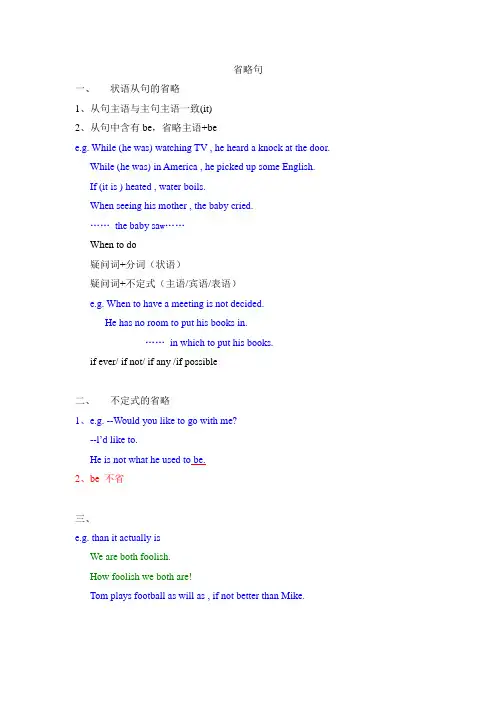
省略句一、状语从句的省略1、从句主语与主句主语一致(it)2、从句中含有be,省略主语+bee.g. While (he was) watching TV , he heard a knock at the door.While (he was) in America , he picked up some English.If (it is ) heated , water boils.When seeing his mother , the baby cried.……the baby sa w……When to do疑问词+分词(状语)疑问词+不定式(主语/宾语/表语)e.g. When to have a meeting is not decided.He has no room to put his books in.……in which to put his books.if ever/ if not/ if any /if possible二、不定式的省略1、e.g. --Would you like to go with me?--l’d like to.He is not what he used to be.2、be 不省三、e.g. than it actually isWe are both foolish.How foolish we both are!Tom plays football as will as , if not better than Mike.四、I think so/l don’t think so.I hope so/l hope notI’m afraid so/l’m afraid not。
省略句为了使话说得简明扼要,英语句子中某个单词、短语甚至从句或主句都可以省去。
这种省去句子某些成分而保持句子意思不变的现象,称为省略(ellipsis)Ⅰ、状语从句中的省略用法一、如果从句的主语和主句的主语一致,且从句的谓语含有be动词的某种形式(am/is/are/was/were),可同时省略从句的主语和be动词的某种形式。
1、when,while引导的时间状语从句e.g.Dobecarefulwhen(youare)crossingthestreet.When/While(Iwas)onmywaytowork,Imether.2、3、4、二、三、以if从句为代表的状语从句中的特殊省略用法:通常省略了itis,thatis,thereis/are。
e.g.If(itis)possible/necessary,thisoldtemplewillberebuilt.If(thatis)so,Iwillcallyoubackat5:00pm.Thereareonlyafewbooksinourschoollibrary,if(thereare)any.Ⅱ、定语从句中的省略用法关系词的省略关系代词that,which,whom等在限制性定语从句中充当宾语且不位于介词之后时,可以省略;inwhich或that在先行词way后作方式状语从句时可省略。
e.g.Theman(that/who/whom)youvisitedlastnightismygrandpa.Idon’tliketheway(inwhich/that)youtreatthegirl.Ⅲ、虚拟语气中if及should的省略1、当条件状语从句中有were,had,should等时省略if,把它们提至句首,形成倒装句。
e.g.IfIwereateacher,Iwouldbestrictwithmystudents.=WereIateacher,Iwouldbestrictwithmystudents.2、1、2、E.g3、,love,hate。
英语省略句语法省略I.要点有时为了避免重复,使语言简练紧凑,在不损害结构或引起误解的原则下,往往省去一个或多个句子成分或词语。
1、固定习惯用词。
如:No smoking! Thanks s lot!等。
2. 简单句中的省略(1)口语中,一、二、三人称的主语,有时还包括谓语都可以省略。
如:(It is)Nice to see you!(This is) Li Ming speaking.(2)所有格后的名词如为住宅、商店、工矿、教堂等可以省略。
如:I'm going to visit Tom's (house).I met him at the tailor's (shop).(3)两个或两个以上的动词不定式并列在一起时,第一个不定式带to,后面的不定式可省to.如: His job is to clean and mend the machine.(4)主(宾)语补足语中的to be常省略。
He was considered (to be) the best student in the class.(5)There be结构中there be可同时省略,或只省略there.如:(Is there) Anything wrong?(6)表示年龄的years old, 表示钟点的o'clock, minute等常省略。
如:What time is it now? It's ten (o'clock).3从句中的省略(1)宾语从句,以which, when, where, how和why引起的宾语从句谓语与主句谓语如相同,可省略从句中全部谓语,甚至主语也可省略,仅保留wh-一词。
如:He will come, but we don't know when (he will come).He didn't come, I wondered why (he didn't come).(2)定语从句中可省略作宾语的关系代词,如:The man (whom) I saw in the street the other day is my teacher.(3)状语从句,在时间、地点、让步、方式、条件状语从句中,从句主语与主句主语一致,或从句主语是it,则be动词及其主语常可省略。
省略句的常见形式与解析在英语语法中,省略句是指在句子中省略掉某些成分,但仍能通过上下文来理解其完整的意思。
省略句的使用可以简化句子结构,增加语言的流畅性和简洁性。
本文将介绍省略句的常见形式以及相应的解析方法。
一、主语省略句在一些情况下,句子的主语可以被省略。
通常情况下,主语可以通过上下文中的其他信息来推断出来。
例1:(完整句) Tom is playing basketball.(省略句) Playing basketball.解析:由于上文提到Tom正在打篮球,所以在这个省略句中可以省略掉主语,仅保留动词"playing"来表达完整的意思。
例2:(完整句) She sings beautifully.(省略句) Sings beautifully.解析:由于上文提到的人称代词"She"已经明确了主语,所以在这个省略句中可以省略掉具体的主语。
二、谓语省略句在一些情况下,句子的谓语可以被省略。
这种省略形式多见于短语或句型中,通过上下文就可以理解其意思。
例1:(完整句) He can play the guitar, but I can't.(省略句) He can play the guitar, but I can't play (the guitar).解析:在这个省略句中,通过上文提到的主题"play the guitar",可以省略掉谓语"Not",而保留上文中的句意。
例2:(完整句) John lives in New York, and Mary in Los Angeles.(省略句) John lives in New York, and Mary in Los Angeles.解析:在这个省略句中,由于谓语"lives"已经在上文中出现过,因此可以省略掉后面的谓语,仅根据上下文理解出Mary的具体情况。
英语语法省略句省略句1)不定式在love, mean, want, like, wish, expect, try, intend, plan, refuse, prefer, seem等动词后面2)在happy,glad,eager,ready,willing等形容词后面。
1.---will you join us?--- I should love to(join you).2.I asked him to see the film, but he didn’t want to(s ee the film).3.--- Would you like to go with us?--- Yes, I’m glad to(go with you)4.He doesn’t get up early as he used to. (get up)注意: 如果不定式中含有be, have(助动词), have been, 通常保留be,have(助动词), have been. 1.--- Are you a sailor?--- No, but I used to be.2.---He hasn’t finished yet.---well, he ought to have.1. —I'll be away on a business trip. Would you mind looking after my cat?—Not at all, ________ . (NMET 1995)A. I have no timeB. I'd rather notC. I‘d like itD. I'd be happy to2. —Does your brother intend to study German?—Yes, he intends ________ . (NMET 1998上海卷)A. /B. toC. soD. that5.--- He hasn’t gone to the office up to now.--- Well, he _____.A. shouldB. ought toC. ought to goD. ought to have4. —You should have thanked her before you left.—I meant ________ , but when I was leaving I couldn't find her anywhere. (NMET 2000北京春招卷)A. to doB. toC. doingD. doing to 替代词so / not用于避免重复前面所说过的内容。
1)肯定时 I believe / expect/ guess/ hope/ suppose/ think/ I’m afraid so2)否定时 I b elieve / expect/ guess/ hope/ suppose/ think/ I’m afraid not形式,而think 还有别的表达式即:I think not 或I don’t think so.1.--- You haven’t lost the ticket, have you ?--- ______. I know it’s not easy to get another one at the moment. (2004江苏高考)A.I hope notB. Yes, I haveC. I hope soD. Yes, I’m afraid so2.--Do you think Jack is going to watch a football match this weekend?---________.A.I believe notB. I believe not soC.I don’t believe itD. I don’t believe3、在状语从句中的省略1. Wood gives much smoke while burning.Wood gives much smoke while it is burning. 2. She studies very hard though still rather weak. She studies very hard though she is still rather weak. 3. Unless necessary, you’d better not refer to the dictionary. Unless it is necessary, you’d bette r not refer to the dictionary. 在状语从句中,若从句的主语是it或与主句的主语相同,且在谓语中含有be时,常省略从句的主语和be。
When___(the novel is) published (publish), the novel will become one of the best sellers of theyear.While _____________ (walk) along the street, I heard my name called.He opened his lips as if _____(he were) to speak (好象要说话)1. When first ________ to the market, these products enjoyed great success. (NMET 2004全国卷II)A. introducingB. introducedC. introduceD. being introduced2. It shames me to say it, but I told a lie when ________ at the meeting by my boss. (NMET 2004全国卷IV)A. questioningB. having questionedC. questionedD. to be questioned3. The man we followed suddenly stopped and looked as if ________ whether he was going in theright direction. (NMET 2003 安徽春)A. seeingB. having seenC. to have seenD. to see 4. Generally speaking, ________ according to the directions, the drug has no side effect.(NMET2003上海卷)A. when takingB. when takenC. when to takeD. when to be taken5. Unless ________ to speak, you should remain silent at the conference. (NMET 2003上海春)A. invitedB. invitingC. being invitedD. having invited6. When ________ , the museum will be open to the public next year. (NMET 2002上海春)A. completedB. completingC. being completedD. to be completed7. Though ________ money, his parents man-aged to send him to university. (NMET 2002上海卷)A. lackedB. lacking ofC. lackingD. lacked in8. The research is so designed that once ________ nothing can be done to change it. (NMET2002)A. beginsB. having begunC. beginningD. begun 4、定语从句中1)作宾语的关系代词that,which, whom可以省略;2)the way后面的定语从句中,可以省略that,in which;5. Is this the reason ________ at the meeting for his carelessness in his work?(NMET 2002上海)A. he explainedB. what he explainedC. how he explainedD. why he explained6. What surprised me was not what he said but ________ he said it. (NMET 2004湖北卷)A. the wayB. in the way thatC. in the wayD. the way which7. That's an unpleasant thing to say about your father after________ he's done for you.A. somethingB. anythingC. allD. that精练6.Don’t stop to look up the words in the dictionary while__________.A. readB. readingC. to be readD. being read 7.________ with the size of the whole earth, the highest mountain does not seem high at all.A. when comparedB. compareC. while comparingD. comparing 11.She did what she could _______ him.A. doB. helpC. to helpD. helping 12.--- Andrew won’t like it, you know.--- ________ ? I don’t care what he thinks!A. so whatB. So whereC. so whyD. so how3.--- What’s Joan doing?--- ______ newspapers in the room.She reading B. She readsC. To readD. Reading4.--- Will you waste your time and money on that? --- Certainly_____.A. I notB. don’tC. notD. n o7. --- Don’t forget to come to my birthday party tomorrow. ---_______.I don’t B. I won’tC. I can’tD. I haven’t8. --- Alice, why didn’t you come yesterday?--- I____, but I had an unexpected visitor. A. had B. would C. was going to D. did 10.It is well known that the horse will run faster if _______.A. is whippedB. whippingC. it whipsD. whipped 17. We all know that, ______ , the situation will get worse.A.if dealt not carefully withB. if not carefully dealt withC.not if dealt carefully withD. not if carefully dealt with。